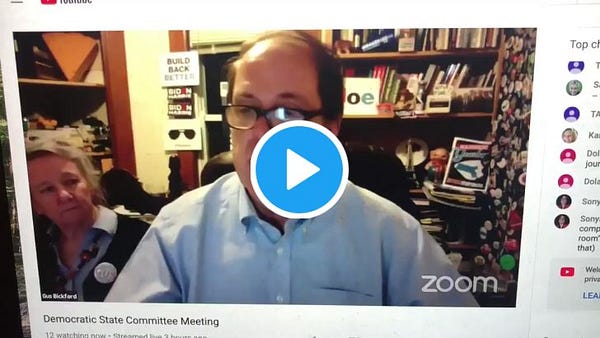Mass Dems Overwhelmingly Reelect Gus Bickford Chair Despite His Involvement in Alex Morse Smear
"I would not blame young people, people of color, and the LGBTQ+ community for looking at what just happened and saying there is no place for me in the Democratic Party."
This article was produced in partnership with the Boston Institute for Nonprofit Journalism.
Members of the Massachusetts Democratic State Committee on November 12 reelected Gus Bickford, the incumbent chair whose involvement in the scheme to undermine Holyoke Mayor Alex Morse’s primary candidacy became a national story.
Bickford far outpolled Bob Massie and Mike Lake, the two candidates who were running to replace him, to take around 62% of the vote. The result left a bad taste in the mouths of party members who hoped for some comeuppance in the wake of the three month long scandal.
"You just expect the party you believe in and work for to do the right thing," said Rebecca Pinn, secretary of the Young Democrats of America in Massachusetts and a DSC member.
Gus Bickford and Alex Morse. (Image: composite)
They “don’t care”
Bickford's involvement in the scheme was explained in an internal state party report by former state Senator Cheryl Jacques that was released November 5. The report found that Bickford, along with DSC executive director Veronica Martinez and attorney Jim Roosevelt, acted inappropriately by inserting themselves into the primary fight and weaponizing the allegations against Morse to harm the insurgent campaign in Massachusetts’s First District.
Reporting at The Intercept in August helped reveal the extent of the plot. Ryan Grim and Daniel Boguslaw revealed the students who were behind the accusations against Morse were sympathetic to incumbent Rep. Richard Neal. In subsequent stories, I detailed the involvement of DSC leadership in the scheme.
Our articles revealed that Martinez pressured students to delete communication records and that the plot had been in existence since at least April, with unknown persons reaching out to reporters and groups with vague but troubling accusations. Local media played a role too, amplifying the initial accusations before ignoring our revelations of the party’s misconduct.
The investigation into the scandal, which was assigned to Jacques in September, ran past its deadline. Jacques found damning evidence backing up our reporting and the extent of leadership’s involvement in the plot—despite their claims that they were only marginally involved in the scheme.
According to Jacques:
Claims of “no further involvement” were repeated on many occasions, however, this was not the case. In fact, as I previously found, there was significant communication between Veronica and [then-CDMA President Hayley Fleming] after Hayley had been referred to Jim. I conclude that DSC staff were not honest in their public communications denying that they had further involvement in this matter once CDMA was referred to legal counsel.


Despite Bickford's participation in the smear campaign, DSC members overwhelmingly voted to give him another term.
"To me, it says that many longer time members don’t care what he did," said Matt Walsh, a member of the DSC and a board member of the Bay State Stonewall Democrats. "They don’t care that he acted unethically, and they don’t care that he broke the bylaws. At the end of the day, he’s the devil they know. No matter what he does, they prefer him to a progressive who would change the status quo they rely on."
One DSC member, who commented on condition of anonymity because of their position, told me that the chair’s reelection has angered "core constituencies" in the party, like youth and LGBTQ+ communities.
"I would not blame young people, people of color, and the LGBTQ+ community for looking at what just happened and saying there is no place for me in the Democratic Party," said the member.
Morse agreed.
"Gus may have won the election," said Morse, "but he certainly doesn’t have the trust and confidence of Massachusetts Democrats overall, and him remaining at the helm will only hinder our ability to win critical elections moving forward."
Sanctioned behavior
The rallying of the old guard behind Bickford was seen by members opposed to his chairmanship as evidence that the party was de facto condoning his behavior in the scandal—and opening the door for continued meddling in contested primaries going forward.
Pinn said that Gus's reelection hurts because of what it says about the party's willingness to overlook—or even endorse—his behavior.
"Anytime you want change and it doesn’t happen, it’s disheartening," said Pinn. "In this particular instance, it's different given the CD1 primary scandal and the conclusions of the report. In corporate and nonprofit settings, this would get someone fired. So, to then be reelected? It’s infuriating."
To Walsh, the vote shows the fissures in the party and an unwillingness for the party establishment to listen to its younger members.
"Bickford’s reelection is a clear example of the growing divide in the Democratic Party," said Walsh. "While young people, LGBTQ+ folks and people of color voted overwhelmingly for a new chair, lifetime members who are no longer accountable to voters and rarely attend meetings showed up to put their thumb on the scale for him— and he won."
Generational split
The vote was not close, due to a voting bloc of longtime party members who hold honorary lifetime positions in the DSC.
"While I’m disappointed, I’m not surprised," Morse told me. "The committee is comprised of largely lifelong members that are out of touch with reality and our communities."
Once people have been on the committee for 20 years, they don't have to run again. According to DSC member Zelda MacGregor, that means they "very quickly start making up a huge voting bloc of the party" which wields outsized force.
"This could be solved by increasing add on seats to improve the diversity of the party but also equity," said MacGregor. "I have to run every four years and can be held accountable for my role as a governing member of the party—they don’t."
According to DSC member Nancy Stenberg, "16% of the 20 year members who voted for Gus had not attended a meeting for four years."
The numbers of who voted for, and voted against, Bickford were eye-opening.
"93% of lifetime members who voted, voted for Gus," said Walsh. "86% of people under 36 voted against him."


"Younger and newer members of the State Committee overwhelmingly voted for candidates not named Gus Bickford," said DSC member Jonathan Cohn. "Parties often talk about how they want to engage more people, especially more young people, but when the lifetime members overwhelmingly vote to keep a chair opposed by the younger and newer members, it makes it harder to make the case for involvement at a time when social trust is low and the need for engagement is high."
Systemic issues
To committee member Alex Pratt, Bickford’s reelection is indicative of deeper problems within the committee and the state party. Anemic fundraising, a friendly approach to GOP Governor Charlie Baker, and the dominance of the old guard all are part of a deeper series of issues that need to be addressed, he said.
"Right now the Massachusetts Democratic Party is not responsive to our grassroots, is not ready to win in 2022, and is not relevant in decision-making in the Massachusetts political landscape," said Pratt. "Our coalition pushing for change will regroup, strategize, and win."
The meeting, conducted over Zoom, was marred by technical difficulties, praise of Baker, and at least one off-color comment.


Committee member Zelda MacGregor called the entire debacle "an embarrassment" and expressed her regret that the DSC had broadcast it live.
"This was our fourth zoom meeting this year, and there is no excuse for how members behaved," said MacGregor.
The meeting ended as members asked for further discussion of the report.


Morse said his efforts remain directed at effecting change in the First District going forward—something that doesn't require the approval of the committee's old guard.
"I will continue to focus on the needs of our communities—and focus not on gaining favor with an obsolete state committee, but by bringing our progressive message directly to working people who desperately need better policies and a better government," Morse said.





Correction: Over 40% of members of the LGBTQ sub-committee voted for Gus' re-election.